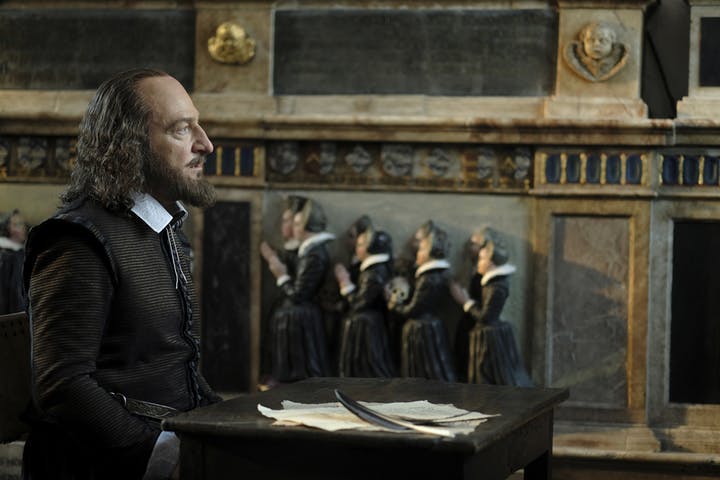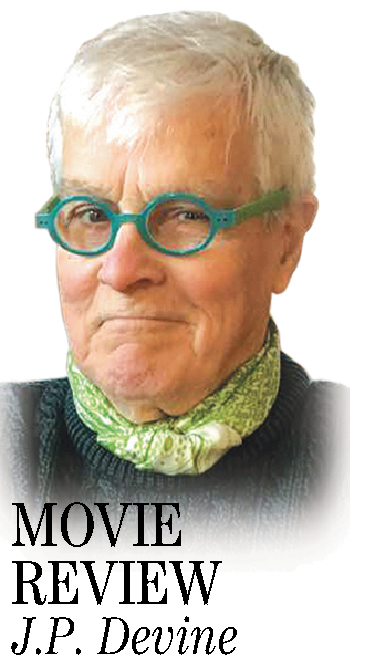It all begins with William Shakespeare with himself standing with cane in front of a screen-wide blazing fire. It is a sad moment, a life-changing moment for old Will, for it is his famous, beloved Globe Theatre burning to the ground.
It is June 2, 1613. In his play “Henry VIII” a cannon misfires and sets fire to the dry wood of the theater. It is the last play performed on that hallowed ground.
Behold, actor-director Kenneth Branagh’s “All is True,” which happens to be the alternative title of “Henry.”
Branagh plays Shakespeare, yes he does, with a borrowed Olivier nose and pointed beard. Branagh even changes his voice from melodic tenor in the softer moments to full out Orson Welles in anger. It’s a wonder to behold, probably his greatest work.
Picking up the pieces of his heart, Shakespeare, in Branagh’s wonderful fictional account written by Ben Elton in full Shakespearean flourish, leaves London for good and all, and journeys home to Stratford-upon-Avon to rest up, become once again a family man, and perhaps make up with Anne Hathaway (Dame Judi Dench in all her late years’ glory) for the 20 years or more gone, when he basked in the heat of applause in London as actor and playwright and set his family aside.
No one really knows what those last years were like, but I’ll take Branagh’s made-up word for it.
Home is a sadder place for Will. His beloved son Hamnet died, it’s said, of the plague, at age 11. But the truth is revealed in a heart-breaking scene played out by Hamnet’s sister (Lydia Wilson).
Young Hamnet (Sam Ellis) appears now and then, dotting in and out as a ghost.
Will’s old mistakes, secrets and lies pop up here. Daughters Judith (Kathryn Wilder) and Susannah (Lydia Wilson) have their own old bones to chew.
There is the matter of some poems. “Brilliant they are” written, Will insists, by the deceased Hamnet. Were they really? That will roar into the house and rattle the rafters.
Anne, seven years older than Will when they married (she three months pregnant), is even now, his senior in temperament.
Anne welcomes the pilgrim home, of course, but gives him a separate room in another part of the house.
“The guest” she says as shuts her door, “is always given the better bed.” He takes his candle and leaves.
So what now, old Bard? Having decided never to write another word, he says, “I think I shall plant a garden.”
Eyebrows go up everywhere, in house and village. A garden? “To honor my beloved Hamnet,” he says. “It shall be his garden.” Anne and the daughters stand by, hands clasped on stomachs, patiently waiting.
And so the greatest writer in the English language sets his quill aside and drops to his knees in the weeds to create Hamnet’s garden, and before the curtain falls, it will blossom.
But in between there are performances that would thrill even the Bard of Avon. Dame Judi, of course, both daughters, Gerard Horan as Ben Jonson and himself, Kenneth Branagh, who walks away with the film, until an old love, Henry Wriothesley, arrives to sit by the fire with Will and stoke old memories. This is, of course, the peerless, unparalleled Sir Ian McKellen, whose appearance brings a touch of levity and a shocking revelation. Not all bardolators will be happy with this.
In the middle moment scene, as the firelight lights his venerable features, McKellen recites his friend’s famous 29th sonnet, a lament of despair that ignites the scene. See it for yourself.
In true British fashion, this lovely film begins slowly and then moves along in gorgeous light and design to its sunset, where Shakespeare died on a cloudy April morning, his birthday.
“All is True” was shot in and around the hallowed ground where Shakespeare walked, including a few tossed-in London scenes.
It doesn’t really matter, with Branagh, McKellen, Dench, Wilson, Wilder all wonderfully cast, they could have shot it in Central Park.
“True” couldn’t be a better way to end a dark spring. Enjoy.
J.P. Devine, of Waterville, is a former stage and screen actor.
Send questions/comments to the editors.




Comments are no longer available on this story